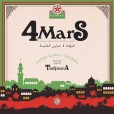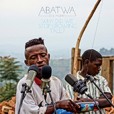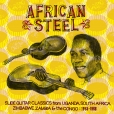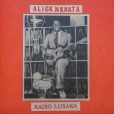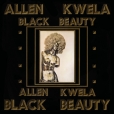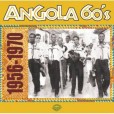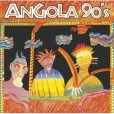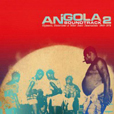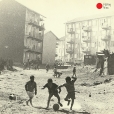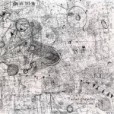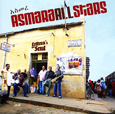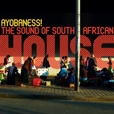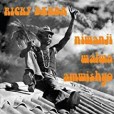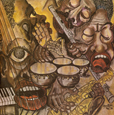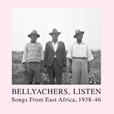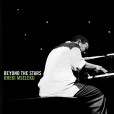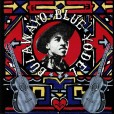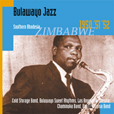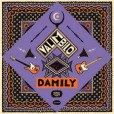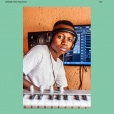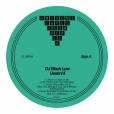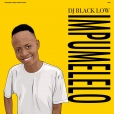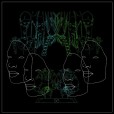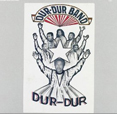Your basket is empty

‘A retrospective of the forty-member Somali supergroup featured on Sweet As Broken Dates. Turkish synths, Jamaican Reggae, American brass, Bollywood vocals, Egyptian and Yemeni rhythms, and Chinese and Mongolian flutes all rendezvous in a corner of East Africa that for centuries served as the world’s most brisk trading hub, the midway point connecting Africa, Asia, and the Mediterranean. This is Somali music at its sassy, soulful, synthesized best. The LP comes with a poster inspired by the political banners of 1980s Djibouti; the CD in a hard cover, with a 12-page booklet.’
A beguiling, one-of-a-kind blend of country, township jazz, and pop, from the heart of Zambia’s freedom movement, by ‘the first African voice on the radio for many Central Africans and the first kind of pop star for many Central Africans.’
Vocalist, guitarist, and bandleader Alick Nkhata moved effortlessly between lonesome country slide, big band pop, and air-tight vocal harmonies, all with roots in Bemba and other African traditional songs and rhythms. It’s a dizzying, inclusive, expansive blend from an artist and music archivist who became the voice of his nation’s fight for freedom. The lyrics and music represent the times — lonesome country laments like Nafwaya Fwaya and Fosta Kayi drift along the railways to urban centers and copper mines. Nalikwebele Sonka (I Told You Sonka) pairs honey-soaked yodels with a warning about the downward spiral of unemployment in townships, while Mayo Na Bwalya (Mother of Bwalya) is a mother’s plea to a traditional songbird for guidance of her wayward son. Songs like Shalapo, Kalindawalo Na Mfumwa, and his biggest hit, Imbote, infuse piano, big band horns, and even early electronic instruments into stunning syncretic pop masterpieces.’
‘It’s great that Zamrock is so well known for its incredible story and music, but that intense focus has a way of flattening the diversity of Zambian music and its history. So maybe we can’t necessarily say that Alick Nkhata led to Zamrock, but that rich history of mixing influences and creating new sounds in the copper belt started with Alick in lots of ways. All of that stuff is what people appreciate about Zamrock — that it was mixing sounds and that it was political in its own way. There’s a long history of that approach in the region, and it starts with Alick.’
Paradigmatic yet forward-looking township jazz from 1975.
Braiding Wes Montgomery into marabi, the legendary guitarist leads a stellar line-up of musicians including Kippie Moeketsi, Barney Rachabane, Gilbert Matthews, Dennis Mpale, and Sipho Gumede.
The opener glances sideways at the commercial success of Abdullah Ibrahim’s recent Mannenberg — but the real magic follows on, when the players cut loose in their own, new directions.
This is the first vinyl reissue. Sleevenotes by Kwanele Sosibo feature interviews with key musicians, and previously unpublished photos.
Hotly recommended by our friends Rush Hour in Amsterdam: ‘Starting off with the positively upbeat Umgababa by Kippie Moketsi and the infectious soul jazz of Pat Matshikiza’ s Dreams Are Wonderful (also featuring Kippie Moketsi) proceedings mellow out on side B, only to get extra heavy on the C-side with the sample-ready fusion groover Night Express off their crazy rare 1976 album of the same name and the irresistibly funky Blues for Yusef by Lionel Pillay, two of the many highlights on this action-packed thriller.’
Startlingly accomplished new jazz from South Africa, teeming with ideas, influences and idioms.
Maybe you remember Asher’s drumming on Angel Bat Dawid’s The Oracle.
Hotly recommended.
The first half of the Something Is Wrong CD set, beautifully pressed and presented, with its own twelve-inch-square booklet.
An electrifying, previously unreleased studio album, recorded in 2003, this stunning solo piano suite condenses Mseleku’s visionary overstanding of South African music into a flowing, pulsing statement in six parts. With jazzwise echoes of marabi, amahubo, maskanda and Nguni song forms binding it to the deep music of Mseleku’s Zulu heritage, Beyond The Stars provides what Blue Note recording artist Nduduzo Makhathini describes in his liner notes as ‘a divine summary’ of Bheki’s life story: ‘a sonic pilgrimage from the beautiful and organic landscapes of Durban, to the vibrant energy of London and ultimately toward the inner dimensions of one’s being.’
A magnificent start by new label Tapestry Works.
‘Lovely country & western-inspired music from 1950s Zimbabwe, South Africa and Kenya. Fingerpicking ‘omasiganda’ troubadours, train-car yodels, raw slide guitar and haunting travel-weary ballads, from rare 78s all reissued here for the first time. A heavy duty document of a nearly lost scene, and all the songs are stunners to boot. George Sibanda, Josaya Hadebe, Sabelo Mathe, Petrus Mntambo… In old-school tip-on covers, with a 12” booklet of deep research and full lyrics. Co-released with Olvido.’
In front, trumpet and tenor saxophone, dominated by a wailing alto sound you can trace through to Dudu Pukwana; the bottom end, trombone or tuba or double bass; banjos strumming away; military-style drumming.
Bilo is a kind of depression; the valimbilo is the person who helps you through it.
The cure for bilo is music. The patient sits opposite the players, who hone in on the sickness, which must be awakened, seduced and ambushed from every angle by sound, till breaking point. Once the bilo is overcome with the music, the patient recovers, and the ceremony ends.
Another walloping dose of Tsapiky music from Madagascar.
Stark, moody, percussive amapiano.
Precious, late-eighties dance music from Mogadishu. Big group — three horns, four singers plus three backing, two guitars, keys, drummer, two percussionists, bassist — choca with funk swagger and highlife shimmy.

